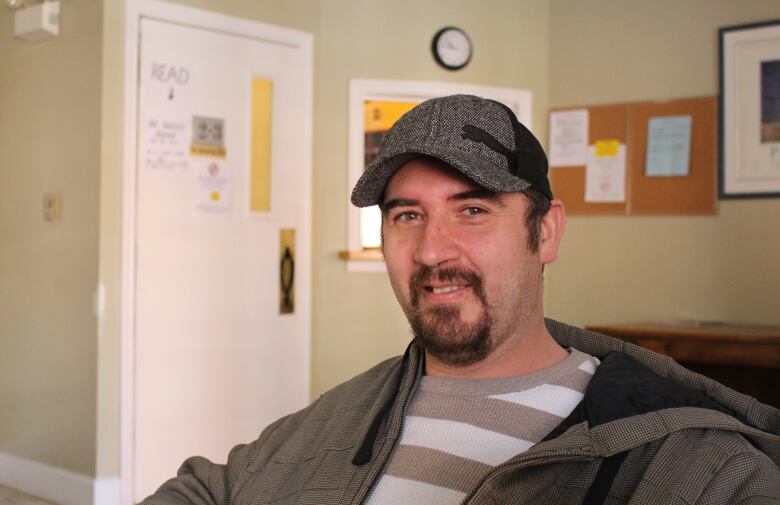A rooming-house super's hard-earned wisdom about homelessness
Randy Black has spent 7 years living with those on the margins and knows housing alone won't fix the problem

Rooming houses often have a bad reputation, but SunsetHouse in Monctonis known as one of the good ones, and a no-nonsense superintendent from Albert County is a big part of its success.
Randy Black moved into the three-storey rooming house on Queen Street seven years ago, when he was looking for a cheap room downtown.
I'm the father, I'm the landlord, I'm the counsellor, I'm the friend.- Randy Black
At that time he worked in security, but landlord Paul Robichaud quickly hired him to be the live-in superintendent.
Robichaud said that back then, he was seeing a big increase in the number of tenants struggling with addiction. Thebuilding had gone downhill.
"We were dealing with a lot more than just people having a few beers on the weekend," he said. "Dealing with people with addictions and mental health is a totally different clientele."

When Black arrived, the rooming house was "overrun by drugs" and at a crossroads, he said.
Black remembers telling Robichaud, "You're at the point you're going to shut it down and get condemned or you're going to put your foot down and clean it up and save a spot downtown for people that are low-income that can live safe, outside of the drug world."
More than a super
Black doesn't just collect the rent and keep the common areas clean. And he's not a nosy, prying super, either.
But he does make sure tenants take their medication, last week he drovea couple to the hospital to have their baby, and he's even helped some people with their resums.

"Everybody really is an individual and you got to sit down and figure out person-by-person what's going on with them and why they're here," he said.
Many of the tenants have had "some pretty amazing jobs," including careers in journalism and sports.
"We had one guy in here had six trips to Canadian Nationals on the Moncton baseball team six gold medals every time they went, and he winds up at the end of the day in a rooming house, and you wonder, 'How did they wind up here?'"

Black has his own place on the first floor of Sunset House, and monitors what's going on with his tenants, who mostly come from shelters or the streets.
"We bring them in and set them up and try to get them to progress in their life. Find work, deal with their problems and get better and move back into the workforce or society.
"I'm the father, I'm the landlord, I'm the counsellor, I'm the friend."
Calls for better detox
"I try to be firm but fair," Black said of his approach as a superintendent. "Basically I stick with, 'No pills, no powder, no needles.' I keep hard drugs out of here because that's the majority of my problems. And after that, pay your rent."
In his seven years at Sunset House, Black has kicked out countless drug addicts and is convinced housing alone won't solve the crisis in homelessness.
They can throw $300 million at this all day but sooner orlater that money's going to dry up and you still have an addict just hidden away in a house.- Randy Black
He hasseencrystal methovertake cocaine and crack as the drug of choice, but said the detox programs offered in New Brunswick haven't kept up.
"Our detoxes are made for the '70s and alcohol," Black said.
"This drug is not like coke. It actually melts their mind."
He worries that no matter how many millions government spends on affordable housing, nothing will change for people struggling with addiction unless drug treatment programs improve.
"They're not staying long enough to get clean. It's a seven-day stay. By that time, they're jonesing, they're back out on the street. Well, what are you going to do on the street when you're jonesing? You're going to commit crime to get money to get back to your druggie."
Black said providing housing is a good first step, but unless there is help for the challenges people face, tenants end up right back on the streets.
"They can throw $300 million at this all day but sooner orlater that money's going to dry up and you still have an addict just hidden away in a house."
Closer relationship with Social Development
Robichaud said at one point, he was collecting rent from just 65 per cent of his tenantsand repairing two or three units every month at a cost of several thousand dollars each.
Getting rid of the hard drugs and having a new agreement with the Department of Social Development have improved both problems.
Robichaud now offers tenants who receive social assistance a"mixed payment" option, where the department pays him directly for the room, with the balance of the tenant's cheque going to the tenant.

"It was the first time that I was able to see that the government really was willing and interested in doing something with rooming houses, and it was great."
Black hopes the communication between the government, and front-line workers like him continues to improve.
Everybody's going to scratch their heads wondering, 'Why ain't this fixed?' It's not fixed because you never dealt with the problem. You're hiding it, you're not dealing with it.- Randy Black
He admits, however, that he's worried nearly $300 million from the National Housing Strategy will be spent in New Brunswick over the next decade, andthe province will be no further ahead.
"Everybody's going to scratch their heads wondering, 'Why ain't this fixed?'
"It's not fixed because you never dealt with the problem. You're hiding it, you're not dealing with it."












_(720p).jpg)


 OFFICIAL HD MUSIC VIDEO.jpg)
.jpg)



























































































